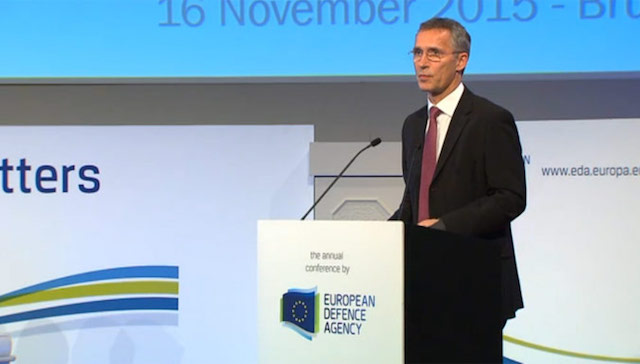Breaking news
NATO Secretary General proposed stronger cooperation with the EU 41711152.
|
|
|||
|
Defence & Security News - (NATO)
|
|||
|
|
|||
| NATO Secretary General proposed stronger cooperation with the EU | |||
|
NATO Secretary General Jens Stoltenberg met with the EU Defence ministers in Brussels today, in the aftermath of the Paris attacks. Yesterday he addressed to an audience at the European Defence Agency. In both occasions, he stressed the need for a closer cooperation between NATO and the EU.
|
|||
|
|
|||
 Jens Stoltenberg during his speech at the European Defence Agency. (Photo: NATO) |
|||
|
|
|||
|
Jens Stoltenberg reminded everyone of the substantial increase of the NATO forces taking part in the collective defence, under the NATO Response Force formation, which has a total strength of 40,000 troops. Moreover, the Alliance has been taking part in counter-terrorist operations for many years now, considering the mission in Kosovo and Afghanistan. That is a clear example that dealing with terrorism has been part of the Alliance's reality for more than a decade now. EU and NATO have tangent interests in the same issues and geographical areas. The crisis in Ukraine and the huge refugees influx are two such cases. Therefore, the two sides can further enhance their cooperation. Both Jens Stoltenberg and Federica Mogherini made clear that they are determined to develop this cooperation. In his speech, NATO Secretary General mentioned three of the potential areas where the Alliance can work hand-in-hand with the European Union. The first one is meeting “hybrid threats”. This old form of warfare, often mentioned as low-intensity conflict/warfare, combines military with non-military means. Therefore, a wide range of civilian and military tools is required to deal with it. Some of these are situational awareness, civil preparedness, cyber defence, joint training and strategic communications. A second area of cooperation is the support towards partners in the geographical area of interest. NATO is providing assistance to Jordan, Tunisia, Iraq, Ukraine, Moldova, Georgia and other countries to deal with terrorists and deter any other threats against their sovereignty. From its part, the EU is helping neighbouring countries, including the aforementioned, to develop their economic sectors and political institutions. However, both sides would be able to make a greater impact if they cooperated so as to have a coordinated approach. Finally, the third area of cooperation is the defence industrial sector. Both sides have strong defence industries. Nevertheless, Europe should be able to retain its autonomy and capable of cooperating with its transatlantic partners, in order to stay ahead of the innovation curve. Investing in dual-use technology is an important factor to offer benefits at the civilian and the military sectors, with cost-effective and interoperable solutions. This vision led to the creation of the NATO-Industry Forum. |
|||



















